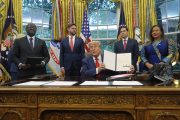
Something similar, but more subtle, can be seen today. Barack Obama had been president for exactly one month when he addressed a gathering of the nation’s mayors in Washington last Friday. One month apparently was time enough for him to flex his imperial muscles and survey his vast new powers. For he warned the city mayors that he would be watching them to make sure the money they receive under the economic stimulus bill is spent wisely and well: “If a federal agency proposes a project that will waste that money, I will not hesitate to call them out on it, and put a stop to it,” he said. “I want everyone here to be on notice that if a local government does the same, I will call them out on it, and use the full power of my office and our administration to stop it.”
Well now. Who needs golden thrones and purple robes when you have that kind of power? And it is virtually uncontested power. Apparently none of the mayors objected to the notion of working for the person who now holds the office of president. “We don’t mind being called out,” said Mayor Doug Palmer of Trenton, New Jersey. “We welcome that kind of accountability.”
“We get called out every day at the local level,” said Mayor Manny Diaz of Miami, who leads the U.S. Conference of Mayors. “We have plenty of constituents who will be doing that before the president does.”
But Mayor Diaz overlooks an important point. It is the right and even the duty of the people to “call out” their local officials over how their tax dollars are being spent and how government is being run in their respective cities and towns. It is not among the powers and duties of the president of the United States.
If the president is going to be doling out all that money, one might argue, then surely he has an obligation to the taxpayers to see that it is spent responsibly. But that is actually a good argument for not authorizing that spending in the first place. The primary duty of the president and members of Congress is to recognize the limits of their powers under the Constitution they have sworn to uphold. And there is no authority in the Constitution for the orgy of “bailout,” “buyout,” “rescue,” and “stimulus” measures that have been enacted over the past several months during the end of the Bush administration and the beginning of Obama’s, massively increasing the debt owed by the nation’s taxpayers and their posterity.
We now appear on the verge of nationalizing some of the nation’s major banks and other financial institutions that have already received billions under White House and congressional “rescue” plans. Congress and/or the Obama administration will soon be telling automakers what kind of cars to make and how to make them. (There will be, as George Will has predicted, “535 automotive engineers” in Congress.) We seem to be nationalizing everything, including state and local governments.
The powers of the federal government under the Constitution would be “few and defined,” James Madison assured the readers of The Federalist Papers. Those powers left to the states and to the people would be “numerous and indefinite.” But why nitpick and quarrel over principles like separation of powers and the delegation of responsibilities to different levels of government? Just give us the money, say California Governor Arnold Schwarzenegger, a Republican, and Michigan Governor Jennifer Granholm, a Democrat. If Republican Governors Mark Sanford of South Carolina and Bobby Jindal of Louisiana are reluctant to take their states’ portions of the stimulus money, Michigan and California will be happy to take that money, along with their own allocations.
Indeed, Schwarzenegger has been quite generous in his praise of Obama over the stimulus bill. The California governor is also for abortion “rights,” “gay rights,” and massive spending to fight “global warming.” Asked why he is still a Republican, he said, “Because I believe in the principles of the Republican Party.” Yet when it comes to solving problems, Schwarzenegger sees himself as a pure pragmatist. “Never mind party, never mind philosophy.” Never mind, in other words, the principles he says he believes in.
Meanwhile, Obama is watching, and he’s watching more than just the mayors. Last year, Senator Obama voted for a bill authorizing the president to intercept international communications of Americans without the previously required warrant from the FISA court. His choice for CIA director, Leon Panetta, told senators the new administration might well continue the Bush administration policy of kidnapping foreign nationals suspected of terrorist connections and sending them to third-party nations for interrogations (read: torture). Obama continues to send unmanned bombers after suspected terrorists in Pakistan, despite the protests of the Pakistani government over the killing of civilians. But since the al-Qaeda we are after are also civilians, the distinction is a bit tricky.
President Obama did not go to Congress for a declaration of war in order to bomb targets in Pakistan. Surely a “government of the people, by the people and for the people” is out of control when a single man can decide when to launch offensive military actions. But the new president has plenty of precedent. Our commanders in chief have been carrying on this way for quite some time. Obama has, to be sure, inherited the wars in Afghanistan and Iraq, and a national debt of, at last count, $10 trillion. But he is building rapidly on his inheritance. From Abilene to Afghanistan, from Bangor to Baghdad, Obama is watching over the world and will spare no cost to work his will upon it.
The president of the United States today is a modern Caesar who “doth bestride the narrow world like a Colossus,” leaving us to wonder: “Upon what meat doth this our Caesar feed/ That he hath grown so great?”
— Photo: AP Images




